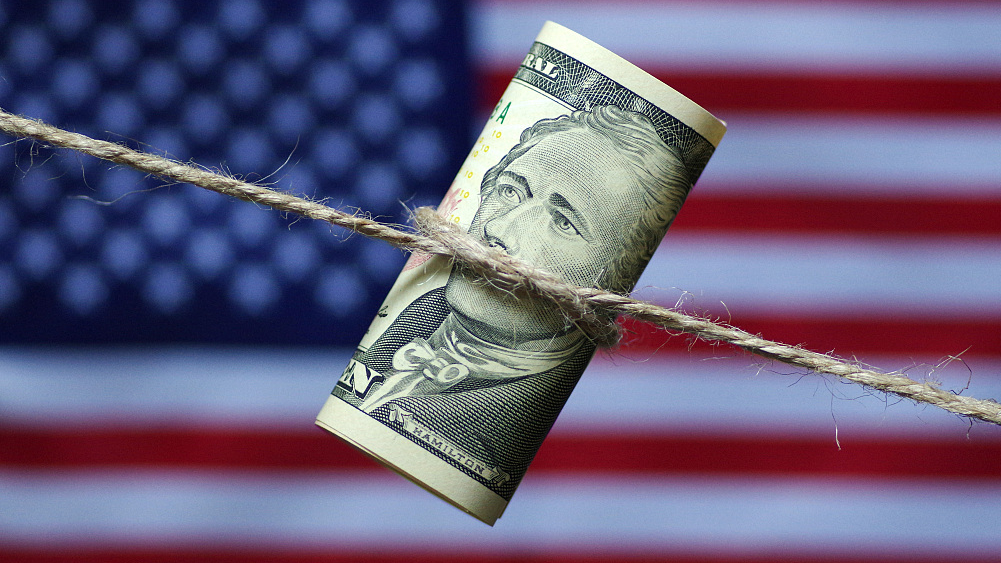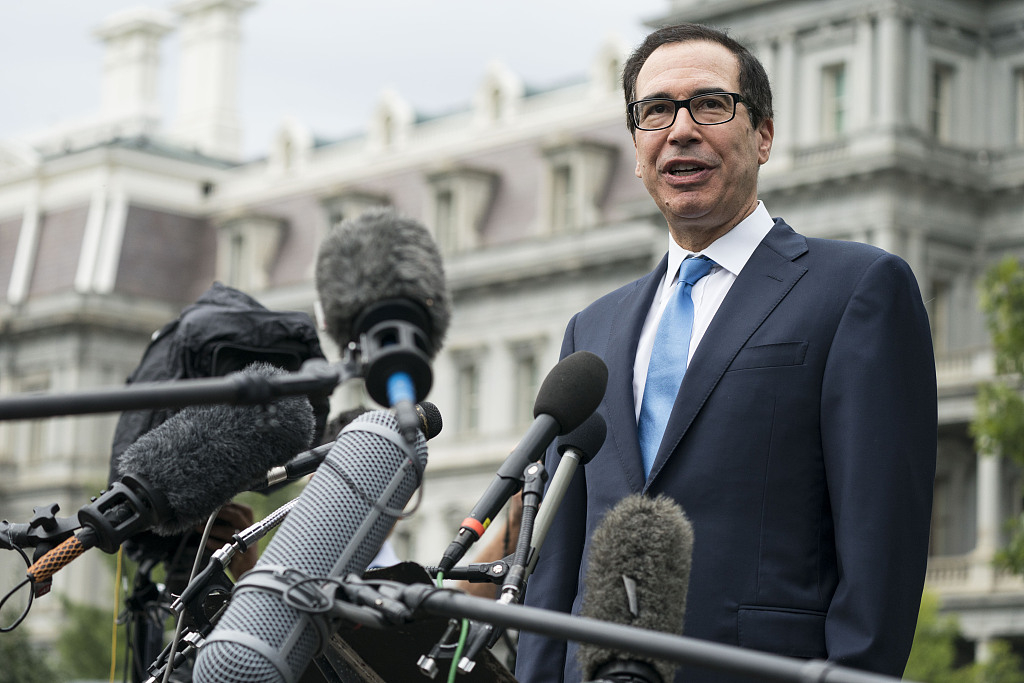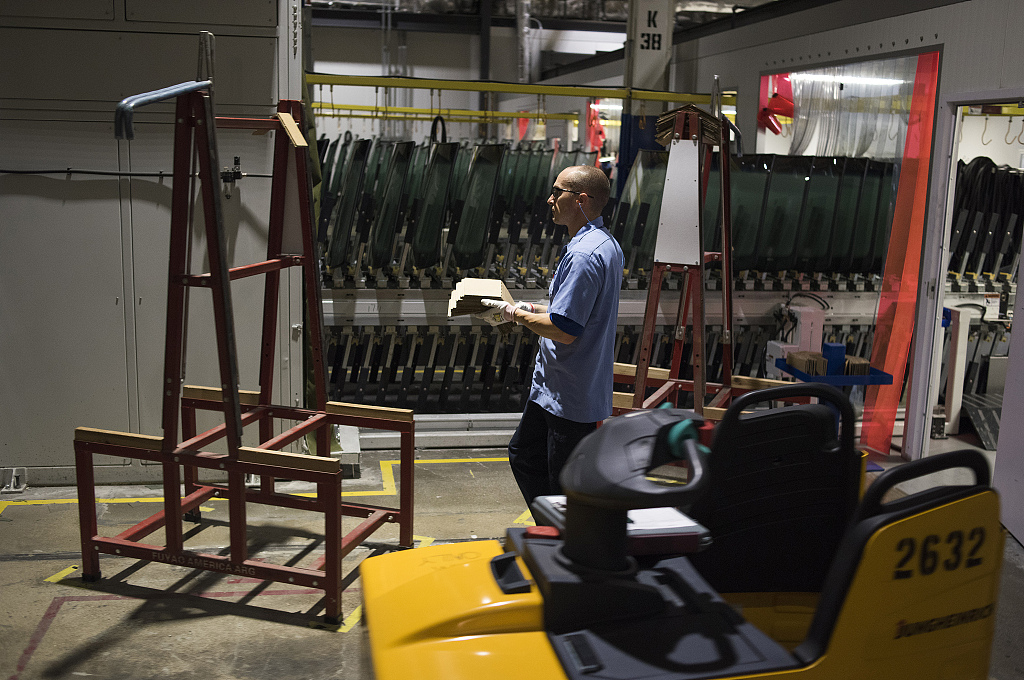

Editor's Note: Tom Fowdy is a British political and international relations analyst and a graduate of Durham and Oxford universities. He writes on topics pertaining to China, the DPRK, Britain and the United States. The article reflects the author's opinions and not necessarily the views of CGTN.
On the night of September 9, Secretary to the Treasury Steven Mnuchin offered reporters an update on the status of the China-U.S. trade war.
During the interview, the official painted the direction of talks in a positive light (although he has always done so) stating that the two sides had secured a "conceptual agreement" on "enforcement," as praising Beijing's actions as "a sign of good faith that they want to continue to negotiate" with talks set to continue at a vice-ministerial level this October between officials.
However, in the interview Mnuchin insisted that the trade war had not impacted America's economy. He stated that he had "not seen an impact" and foresaw a "very robust finish to the year" with "no signs of recession."
On the other hand, he was eager to note that Trump's tariffs had "impacted the Chinese economy, thus repeating a well-established line by other officials in the administration which also claim America is unscathed through Trump's tensions.
But is he telling the truth? For all we keep hearing guarantees from the White House concerning the economy, the media and official data are increasingly skeptical of this. Far from having no impact, trade disruptions and souring ties with Beijing are hurting the U.S. economy in a number of areas accumulating in a slowdown which has not yet reached its climax.
The administration, however, not known for its political honesty, is not willing to confront this. As Chief Economist at Pantheon Economics Ian Shepherdson notes: "It's fair to say that Mnuchin is either clueless or compromised by his love of proximity to power, or both."
So let's get down to the real numbers. How is the trade war hurting the American economy?

Steven Mnuchin, U.S. Treasury Secretary, speaks during a news conference on the North Lawn of the White House in Washington, D.C., U.S., September 9, 2019. /VCG Photo
First of all, U.S. jobs growth is suddenly down and weaker than expectations. The economy added 130,000 jobs last month, missing an anticipated target of around 158,000, which has been the monthly average. The previous year, that average had been 223,000.
In addition, an American staffing company Challenger, Gray & Christmas found that tariffs had already wiped out 10,000 jobs alone and in an analysis of big companies found that the levies had been cited as a concern over 650 times.
Secondly, U.S. manufacturing is slumping. Despite Trump's claims that his trade wars would win back American jobs and industries from China, American manufacturing has contracted for the first time since 2016.
In 22 states, the amount of manufacturing jobs subsequently declined, including in Trump supporting heartlands such as Wisconsin and Pennsylvania, with the latter having lost 8,000 jobs in this sector. Business economist Chris Williamson at the firm IHS Markit said the downturn was attributable to "deteriorating exports" with "new orders from foreign markets dropping at the fastest rate since 2009."
Although the question remains unclear if the United States will fall into an outright recession, what the data does demonstrates is that quite clearly the country is experiencing a slowdown and in turn, that slowdown is attributable to what the Institute for Supply Management (ISM) describes as "a notable decrease in business confidence," which of course stems from the trade war.
This uncertainty is in turn hurting foreign investment into the United States. For example, Bloomberg reports that FDI into commercial property in America has dropped nearly 50 percent in 2019, falling from 32.7 billion U.S. dollars to 16.9 billion U.S. dollars: again the primary reason is a global slowdown and uncertainty.

An employee carries cardboard packaging to cover the corners of the auto glass at the Fuyao Glass America production facility in Moraine, Ohio, U.S., August 19, 2016. /VCG Photo
Given this data, what will it take for the Trump administration to confront this reality? The line of denial over the trade war is not new and perhaps given the political capital which has been placed on such a move, is difficult to come to terms with.
The president has looked for new scapegoats for unfavorable economic news, blaming the Federal Reserve and demanding they lower interest rates, not a sign of course of confidence.
There has also been a noticeable increase in rhetoric which argues economic pain in the trade war is "politically worth it" to stop China, something which may be accelerated if a deal is not reached any time soon.
However, this cannot answer for everything. Scapegoats cannot make excuses for a poor economy in the long run. If he doesn't end the trade war, then what is Trump's economic strategy going forward from here, and what his contingency plans for a slowdown? There aren't any.
He doesn't have a coherent policy. The White House cut taxes in 2017 and essentially created a "sugar rush," one which is now wearing off and further being sobered by an increasingly escalatory trade war.
Given this, one must wonder how long officials can keep up the charade of persistent dishonesty over the impact of tariffs. Steven Mnuchin is merely the latest voice to play down what the Department of Commerce described only this week as a "major threat to the longest expansion in American history."
(If you want to contribute and have specific expertise, please contact us at opinions@cgtn.com.)

Copyright © 2018 CGTN. Beijing ICP prepared NO.16065310-3
Copyright © 2018 CGTN. Beijing ICP prepared NO.16065310-3